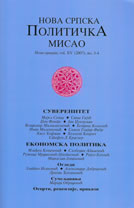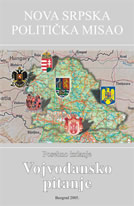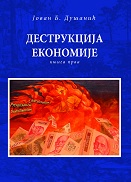| NSPM in English | |||
Who’s dressing up Karadzic? |
 |
 |
 |
| уторак, 29. јул 2008. | |
|
Тhe former Bosnian Serb war leader has been painted as a Hitlerian monster to try to boost the moral authority of the international community. It seemed strangely fitting that Bosnian Serb leader Radovan Karadzic was found in an elaborate disguise when he was finally arrested, accused of genocide. Many in the international community have spent more than a decade dressing up this unexceptional local nationalist leader as a Hitlerian monster. Perhaps it was also appropriate that he had apparently spent his years in hiding since the civil war in the former Yugoslavia practising as an alternative therapist. The moral crusade to turn the Serbs into the new Nazis, pursued after the Yugoslav civil war through the hunt for Karadzic on charges of genocide, has served as a strange sort of therapy for many in the West. By branding the Serbs as evil, they have found a way to make themselves feel righteous. In the process, they have distorted the realities of Yugoslavia’s civil wars, risked diminishing the history of the Nazi Holocaust, and paved the way for further disastrous Western interventions. That last point makes the Western crusaders even more determined to hang on to their anti-Serb banners today. The Balkan wars of the 1990s marked the high tide of the liberal left’s new moral case for international intervention in the affairs of nation states. The Iraq debacle has since left the credibility of that cause in tatters. The notion that they were taking a stand against the new Nazis in Bosnia and Kosovo has become just about the only thing the pro-interventionists can hold on to as proof that they are on the side of right. That is why, after the capture of Karadzic this week, the new Nazi-hunters are cock-a-hoop, with Paddy Ashdown, former United Nations overlord of Bosnia, announcing that he was off to celebrate with his Bosnian friends. Whether they find it quite so comforting when they have to deal with the man rather than the monster in court remains to be seen. The trial of Milosevic should remind them how such carefully staged showpieces can turn into embarrassing debacles. Neither I nor anybody else at spiked supports Karadzic. During the war in Bosnia he acted as a self-important petty nationalist with a romantic dream and a ruthless streak. And he was far from alone in that. The campaign to demonise Karadzic and nail him for genocide before an international war crimes tribunal, however, has been a politically motivated circus that serves interests other than justice. The fact that he has been arrested as a diplomatic stunt to help the new Serb government gain entry to the European Union is in keeping with a campaign that has been politically loaded from the start. There has always been a strong air of double standards around accusations of war crimes. The very notion of a war crime is questionable, since it suggests that there is a way of waging war that is somehow civilised and done according to the rules of cricket. When a participant in a war is singled out to be accused of war crimes, it is generally a safe bet that it will be one of Them rather than Us – the barbarians of the developing world rather than the gentlemen of the West. When Arkan, the most notorious Serb militia leader, was wanted by the international war crimes tribunal, he said he would appear there after the American government: ‘First let them call in to the Hague Tribunal those who destroyed Hiroshima and Nagasaki, those who killed civilians in those two towns, who attacked Panama and Grenada – and after them, me.’ It was hard to dispute that he had a point. The International Criminal Tribunal for the Former Yugoslavia was voted into being by the United Nations Security Council in 1993, during the Balkans war. It was the first war crime tribunal to be set up since the Second World War. Why was that? There had hardly been a shortage of wars in the intervening half century, many of them bloodier than the Balkans conflict. From the first, the tribunal was a political tool set up in response to the crisis of authority within the West in the post-Cold War era. Its primary aim was to establish the right of the UN Security Council to sit in judgement on the rest of the world. Its political role was most blatantly revealed when it indicted President Milosevic for war crimes during the NATO bombing campaign against Serbia in 1999. But the most striking feature of the crusade to Nazify the Serbs was the role of liberal-left journalists. It was these ‘laptop bombardiers’ who demanded that Britain and the West intervene more forcefully against the Serbs, first over Bosnia and then Kosovo. This, too, was more a product of events within the West. The collapse of traditional left-right politics at the end of the Cold War had left many bereft of a clear mission or cause. Some sought salvation and a new sense of moral purpose via a foreign crusade in the Balkans. Journalists and politicians talked about Bosnia as ‘our Poland’ or even ‘our generation’s Holocaust’, the battle against the Serbs as ‘our Second World War’, a chance to emulate their fathers’ noble fight against the Nazis. To justify this cause they had to turn the complex civil war in the former Yugoslavia into a simple act of genocide by Serb neo-Nazis. There were certainly terrible atrocities committed by Serbs, as well as by Croats and Muslims. Such is the nature of civil wars. But many of the atrocity stories, as in other wars, were distorted to get the required message across. The events in Srebrenica, over which Karadzic has now been charged with genocide, were a case in point. It was a bloody, complicated and prolonged battle, concluded in murky circumstances, at the end of which Bosnian Serbs massacred an unknown number of Bosnian Muslims in cold blood. But there is little to support the assertion that it was an act of pre-meditated genocide (see How did Srebrenica become a morality tale?, by Tara McCormack). The upshot of this propaganda war was to distort perceptions of both the past and the present. Endlessly comparing the Holocaust to a civil war risked denigrating the unique historical crime of the killing of six million Jews. At the same time, the myth was born that here was a new Holocaust that the West had refused to intervene against. The lesson of Bosnia was said to be that earlier and stronger intervention would be needed in the future. In fact, the problem in the former Yugoslavia was that the West had interfered far too much; as always, such interference served to intensify and perpetuate the conflicts. There was no civil war until the tensions were exploded by Germany’s recognition of the breakaway republic of Croatia, and America’s recognition of Bosnia. Having never fired a shot throughout its Cold War stand-off with the Soviet Union, NATO’s first military action was to bomb the Bosnian Serbs in 1995 – and then Serbia itself in 1999. At the end of the war, Bosnia became a divided UN protectorate under the effective dictatorship of an imposed official such as Ashdown. That was why some of us opposed the moral crusade over Bosnia and the wars against the Serbs. Not because we were in some way ‘pro-Serb’ – what reason would there have been to take anybody’s side in the destructive Balkans civil wars? No, it was because we saw the dangers of international intervention, of historical revisionism, and of trying to resolve the problems of Western politics and society on somebody else’s battlefield. It was in that spirit that I wrote a pamphlet in 1997 entitled Whose War is it Anyway? It was in the same spirit that the magazine I edited, LM, published an article about the coverage of Bosnian Serb camps that led to an infamous libel case which we lost (as defendants tend to do under English libel law), leading to the closure of the magazine – and, inadvertently, to the birth of spiked. I have barely written about these issues since then, because I have little interest in Balkan politics. However, the British reaction to the arrest of Karadzic might remind us that there are still some important arguments about issues such as international intervention, justice and war reporting to be had over here. Mick Hume is editor-at-large of spiked. |
Од истог аутора
Остали чланци у рубрици
- Playing With Fire in Ukraine
- Kosovo as a res extra commercium and the alchemy of colonization
- The Balkans XX years after NATO aggression: the case of the Republic of Srpska – past, present and future
- Из архиве - Remarks Before the Foreign Affairs Committee of the European Parliament
- Dysfunction in the Balkans - Can the Post-Yugoslav Settlement Survive?
- Serbia’s latest would-be savior is a modernizer, a strongman - or both
- Why the Ukraine Crisis Is the West’s Fault
- The Ghosts of World War I Circle over Ukraine
- Nato's action plan in Ukraine is right out of Dr Strangelove
- Why Yanukovych Said No to Europe

.jpg)





















